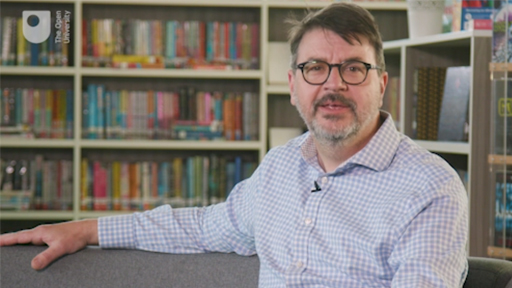1 Identifying and retrieving information
To begin this section, listen to Nick in Video 1 talk about information literacy as an important life skill, which you as a librarian can help to develop in your students.

Transcript: Video 1
Although the internet now means that there is wealth of information available at our fingertips at all times of the day, it is important that users are proficient and effective in finding the information that they want. To do this, as Nick suggested, students need a good vocabulary. Knowing where to source information from is another key component of information literacy. To help with this, people and institutions typically seek to organise and order information. Internet search engines, for example, ‘crawl’ the web for new pages, analysing their content, and adding them to their searchable indexes, which allows users to locate information using keywords and phrases. Similarly, books are indexed to allow users to find specific passages or themes, whilst libraries categorise their books into different classifications. Although the sophistication and scope of different ordering methods may vary, what they all have in common is the aim of making the recovery of information easier, helping users to identify connections and make sense of information that would otherwise be overwhelming.
To be able to take full advantage of your library, students will, therefore, benefit from understanding how its resources are classified. By giving them the appropriate knowledge for navigating your library and by teaching them the skills they need to use an index or select the appropriate keywords for searching online, you will equip them with the skills necessary to identify and retrieve information effectively. For example, in schools or smaller libraries, fiction is often simply shelved in alphabetical order or by genre. When organising larger collections, particularly non-fiction, librarians often use more sophisticated classification systems, the most common being the Dewey Decimal System. This Dewey Decimal system is used in schools, universities and public libraries worldwide and categorises subjects into ten broad groups shown in Box 1.
The Dewey Decimal System
- 000 – Computer science, information and general works
- 100 – Philosophy and psychology
- 200 – Religion
- 300 – Social sciences
- 400 – Language
- 500 – Science
- 600 – Technology
- 700 – Arts and recreation
- 800 – Literature
- 900 – History and geography
These groups are then sub-divided into more specific categories which are, in turn, sometimes followed by the first three letters of the author’s surname. This group of numbers and letters is known as a ‘call number’ and allows library users to locate books with precision.
To understand how this works in practice, take a look at the following two examples:
- Pride and Prejudice by Jane Austen is a work of ‘literature’ (800). A subdivision of ‘literature’ is ‘English literature’ (820). Within ‘English literature’ is ‘English fiction’ (823). This is refined further by period: since Pride and Prejudice is a work of ‘early 19th century fiction’ (823.7) you can deduce that Pride and Prejudice’s full call number would be 823.7AUS.
- The Roman Revolution by Ronald Syme is a work of ‘history’ (900). A subdivision of ‘history’ is ‘ancient history’ (930). Within ‘ancient history’ is the classification ‘Italian Peninsula and adjacent territories to 467AD’ (937). Since the Roman Revolution falls within the period ‘Civil strife, 146–31BC’(937.05) you can deduce that the Roman Revolution’s full call number is 937.05SYM.
As well as having a knowledge of how the library resources are classified, students should also be encouraged to think about how to navigate digital resources. They can be taught about these matters through the use of leaflets, posters, or guides on shared file areas such as the school’s Virtual Learning Environment (VLE). Alternatively, if a class in your school has an upcoming project where they would benefit from having an understanding of handling resources, you may choose to take part in a lesson where you can engage with students directly. Whichever way you approach it, familiarising students with these skills will help them in their studies and equip them with lasting knowledge for life beyond the classroom.
Of particular use are Boolean searches. By using Boolean operators in their searches (‘AND’, ‘OR, and ‘NOT’), students can refine their results and locate information more efficiently. For example, the search ‘cats AND dogs’ would only bring up results that mentions both search terms. Similarly, when using Google, putting quotation marks around your search term (e.g. “cats and dogs”) will only bring up results that contain that exact same wording. Other useful ways of refining searches include the use of keywords, specifying the date so only the most recent articles are retrieved, or including the domain name so only content published by a specific source is returned. For further tips on how to improve search results, Google has put together a handy guide which you can access here.
Activity 1
How confident do you feel personally about information literacy?
Now, irrespective of how you rated your level of confidence, identify one way in which you can further develop your knowledge and skills and in this subject.
Irrespective of your perceived level of confidence, one way you can develop your knowledge of information literacy is by engaging with professional library organsiations. In particular, the Chartered Institute of Library and Information Professionals (CILIP) has an Information Literacy Group which caters to those of all confidence levels by organising meetings, seminars and training events; maintaining the Information Literacy website; publishing the Journal of Information Literacy (JIL); as well as organising the Librarians’ Information Literacy Annual Conference (LILAC). More recently, CILIP and the Information Literacy Group have also co-sponsored the creation of the Media and Information Literacy Alliance (MILA), which aims to champion media and information literacy in the UK.
In the next section, you will explore the related theme of independent learning and discuss how it can be encouraged amongst your students.
